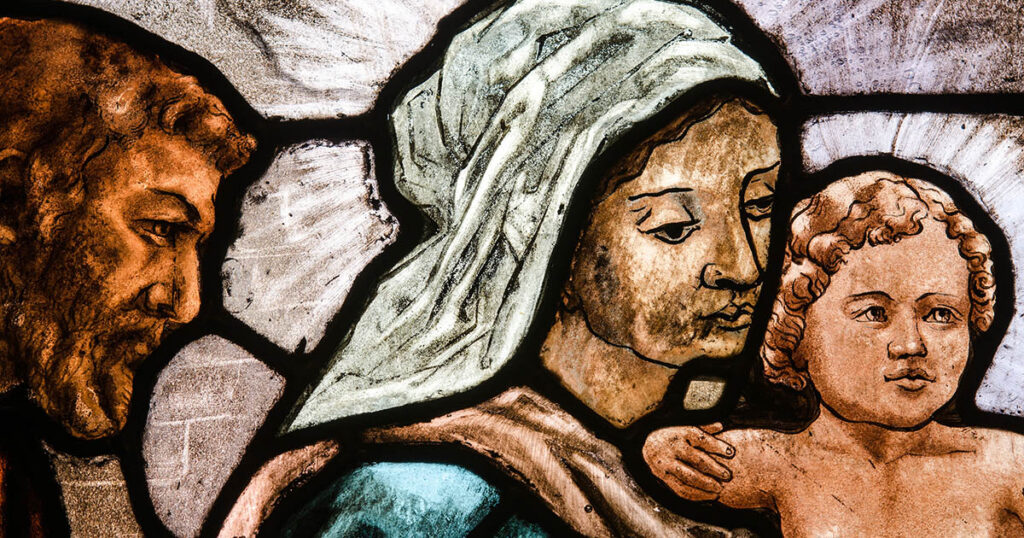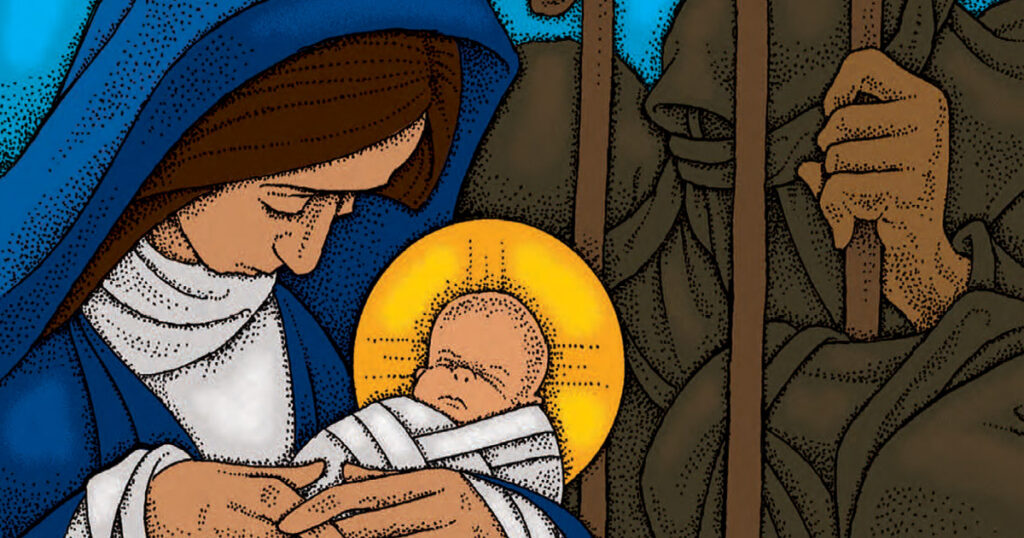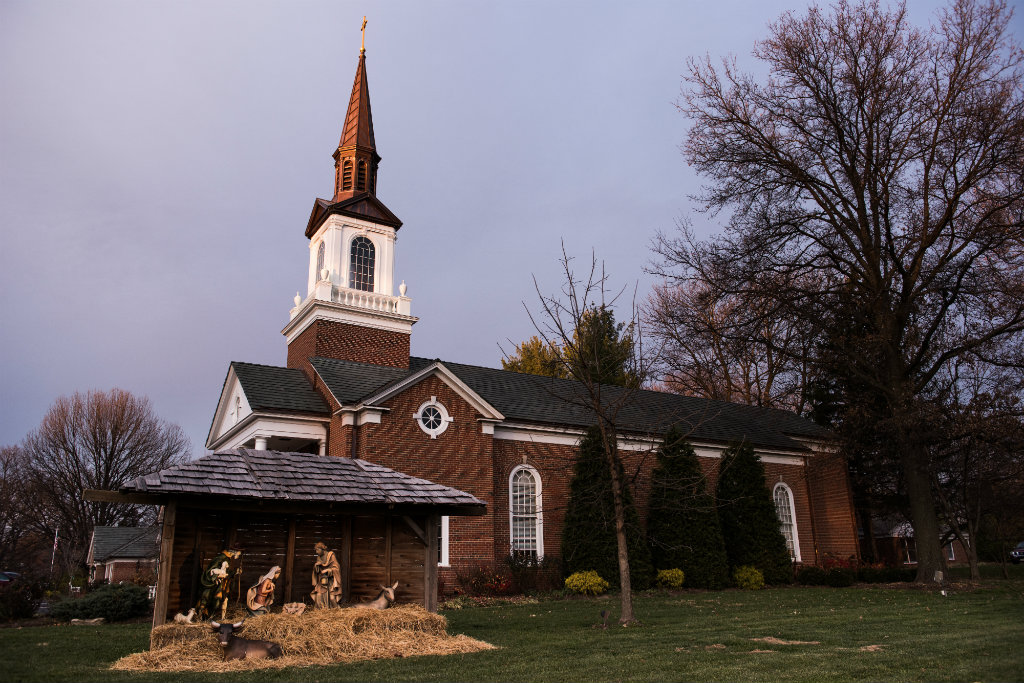There are no accidents in God’s plan for our salvation. He planned and executed everything perfectly for the salvation of mankind. At just the right time, God sent His Son into the world, to be conceived by the power of the Holy Spirit and born of the Virgin Mary. God chose Mary for the special privilege of being the mother of His Son Jesus, and He chose Joseph for the special privilege of being Jesus’ adoptive father.
It was not necessary for Jesus to have an earthly father. He could have been raised by Mary without the assistance of Joseph. Nevertheless, God chose that the events should take place as they did. And God always chooses the best way.
When God arranged for Joseph to become the adoptive father and guardian of our Lord, He put in place a beautiful symmetry for us to consider: The Son of God became man, and the adopted son of a human father so that the sons of men might become adopted sons of His heavenly Father.
In other words, God planned that Joseph should fully adopt our Lord Jesus and raise Him as his own son, so that we may have in Joseph an example of sonship by adoption, a demonstration of the manner by which God fully adopts as His own children those who believe in His Son.
The people in Nazareth who knew Jesus clearly identified Him as Joseph’s son: “Isn’t this the son of Joseph the carpenter?” they asked, when they heard Him reading and teaching in the synagogue. This detail is significant enough to appear in all four Gospels (Matt. 13:55; Mark 6:3; Luke 4:22; John 6:42). The people were amazed that the carpenter’s son was able to read without a literary education (John 7:15), and that He could teach with authority beyond what they had ever heard before (Matt. 7:29).
It seems that by the time Jesus’ ministry began, Joseph had passed away since he does not appear in the Gospels after Jesus’ childhood. Clearly, however, Joseph raised Jesus as his own. Joseph was a righteous man who feared and trusted in God; he observed all the ceremonies of the law of Moses, he protected Jesus as his own son and took Mary and Jesus every year to Jerusalem for the Passover festival. No wonder everyone thought Jesus was his biological son (Luke 3:23).
The Son of God became man, and the adopted son of a human father so that the sons of men might become adopted sons of His heavenly Father.
But out of all the men of Israel who could have served as a custodian and father for Jesus, why did God choose Joseph? Most importantly, Joseph was a son, a descendent of the house of David, in fulfillment of the many messianic prophecies that the scepter would not depart from Judah (Gen. 49:10), that the Christ would be the son of David and that His throne would be established forever (2 Sam. 7:12–16).
We find an additional possibility, however, in Matthew and Luke’s genealogies. Luke writes that Joseph was the “son of Heli” (Luke 3:23), but Matthew says that “Jacob begat Joseph” (Matt. 1:15). Who, then, was Joseph’s father: Jacob or Heli? The answer is, “Yes, both!” The oldest tradition reconciling these genealogies notes that the law of Moses (Deut. 25:5–6) required that, if a husband died without begetting a male heir, his brother had a duty to take his brother’s widow as his wife. The first male she bore would become heir to the deceased brother’s property.
The thought, therefore, is that Joseph was biologically the son of Jacob but legally the son of Heli, according to the inheritance law. Perhaps God chose Joseph because Joseph knew what it meant to have two fathers: One from whom he was descended and another from whom he drew his inheritance. If so, no wonder Joseph does not complain that Jesus, his adopted son, will be his heir. Joseph was heir to the property of someone who was not his biological father.
Many people might be disappointed to learn that Jesus’ right to the throne of David and His claim to the scepter of the kingdom of Israel comes only through adoption because they consider the adopted son to have less of a legal claim than a natural born son. Some even think, contrary to the clear meaning of the words in the Gospels, that one of the genealogies is a genealogy of Mary, because at least Jesus is clearly her son. But we do not need to misunderstand the Gospels this way. Both genealogies belong to Joseph, and this is not a problem. Jesus is the full heir of the throne and kingdom of David because God’s Word gives even to the adopted son the full inheritance that belongs to natural born sons.
Here is a cause for great rejoicing for Christians. God has purchased and redeemed us by the death and resurrection of our Lord Jesus Christ and opened the way of salvation for everyone who believes, granting us the power to become children of God, “born, not of blood nor of the will of the flesh nor of the will of man, but of God” (John 1:13). And although this is a sonship of God by adoption, it comes with a full inheritance, declared legal and binding by the Word of God.
You have received the Spirit of adoption as sons, by whom we cry, “Abba! Father!” The Spirit himself bears witness with our spirit that we are children of God, and if children, then heirs — heirs of God and fellow heirs with Christ, provided we suffer with him in order that we may also be glorified with him.
(Rom. 8:15–17)
Just as our Lord was established to be the full heir to the throne of David by Joseph’s adoption, so we who believe become full heirs to the Kingdom of Heaven by adoption of our heavenly Father. Thanks be to God for His decree that, to all His adopted sons, He gives the full inheritance of His everlasting Kingdom.






Shalom
“Therefore be imitators of God, as beloved children. And walk in love, as Christ loved us and gave himself up for us, a fragrant offering and sacrifice to God.” -Eph. 5:1-2 ESV